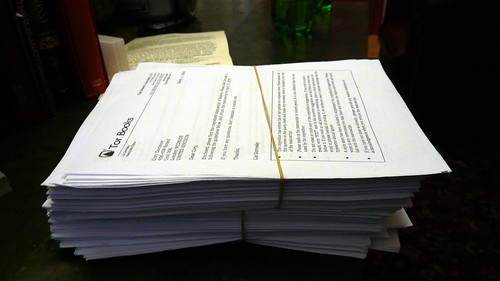Better late than never! The trailer for Justice is finally finished -- just in time for me to need a second trailer for The Tower. Begin exploring the Deck of Lies now!
Justice (Deck of Lies, #1)
Get it everywhere online books are sold!
The Tower (Deck of Lies, #2)
Visit the Books page for free samples
Death (Deck of Lies, #3)
Get book downloads on the Free Stuff page
Judgment (Deck of Lies, #4)
Get the boxed set edition to get even more secrets!
Hope's Rebellion
Get it now!
Saltwater Secrets, Book 1: Song of the Sea
Take the plunge!
Saltwater Secrets, Book 2: Death and the Deep
NOW AVAILABLE!
Writing 101: Length
When does a manuscript cross the line between short story and novel? How long are most books in your genre? When is it a good idea to step outside the box and break the rules? Length is a huge issue in writing books -- make sure you give it the proper respect.
Measuring Length
One hundred pages, eighty thousand words, two thousand lines of text -- the first step in measuring length is using the right yardstick. Lots of writers know exactly how many pages they've written in how many chapters; some can even tell you the amount of days that pass in their story, or maybe how long (to the minute) the book took to write. It's all well and good to know your page count, average chapter length and all those other fun statistics, but when it comes to determining book length there's only one measurement: word count.
Thanks to modern-day computers, a great many writers can simply choose an option and find out exactly how many words are in their manuscript (it's under Tools). But it's not a bad idea to know how to figure out how to determine word count without modern technology -- just in case.
On pages designed one with standard one-inch margins and written in a double-spaced, 12-point non-proportional font, you'll have an average of 250 words on each page. Count the pages, do the math, and you've got your word count.
But let's not forget, we live in a word with modern technology...and the Internet. If you've got to have an accurate word count and your software won't play nice, look for an online word count tool to get the job done.
How Long is Too Long...Or Too Short?
Do you have a short story, a novella, a full-length novel? Does your word count match your genre? There are no hard-and-fast rules in self-publishing, but it's not a bad idea to know what the competition is going to be putting out. Knowing the industry standards for word length gives you an edge, because you'll know how the traditionally-published are playing the game.
Traditionally, short stories fall between 2,000 and 7,000 words, while novellas begin at 7,000 and start to become too big at 17,000 words.Young adult novels generally fall between 50,000 and 60,000 words, while full-length novels for adults are generally around 80,000 to 100,000. Novels over 100,000 words in length are usually considered to be epic novels, and they can spring up in any genre.
You don't always have to play by the rules. Remember that your story should be only as long as it needs to be to tell the whole story. Good books are allowed to break the rules, and great books usually end up making them. Respect and know your word count, but above all respect the story you've got to tell -- because that's what really matters to readers. Mainly, you need to know your word count so you know exactly how to classify and market your book. Don't advertise a novella when you've written a 200,000-word monster.
Measuring Length
One hundred pages, eighty thousand words, two thousand lines of text -- the first step in measuring length is using the right yardstick. Lots of writers know exactly how many pages they've written in how many chapters; some can even tell you the amount of days that pass in their story, or maybe how long (to the minute) the book took to write. It's all well and good to know your page count, average chapter length and all those other fun statistics, but when it comes to determining book length there's only one measurement: word count.
Thanks to modern-day computers, a great many writers can simply choose an option and find out exactly how many words are in their manuscript (it's under Tools). But it's not a bad idea to know how to figure out how to determine word count without modern technology -- just in case.
On pages designed one with standard one-inch margins and written in a double-spaced, 12-point non-proportional font, you'll have an average of 250 words on each page. Count the pages, do the math, and you've got your word count.
But let's not forget, we live in a word with modern technology...and the Internet. If you've got to have an accurate word count and your software won't play nice, look for an online word count tool to get the job done.
How Long is Too Long...Or Too Short?
Do you have a short story, a novella, a full-length novel? Does your word count match your genre? There are no hard-and-fast rules in self-publishing, but it's not a bad idea to know what the competition is going to be putting out. Knowing the industry standards for word length gives you an edge, because you'll know how the traditionally-published are playing the game.
Traditionally, short stories fall between 2,000 and 7,000 words, while novellas begin at 7,000 and start to become too big at 17,000 words.Young adult novels generally fall between 50,000 and 60,000 words, while full-length novels for adults are generally around 80,000 to 100,000. Novels over 100,000 words in length are usually considered to be epic novels, and they can spring up in any genre.
You don't always have to play by the rules. Remember that your story should be only as long as it needs to be to tell the whole story. Good books are allowed to break the rules, and great books usually end up making them. Respect and know your word count, but above all respect the story you've got to tell -- because that's what really matters to readers. Mainly, you need to know your word count so you know exactly how to classify and market your book. Don't advertise a novella when you've written a 200,000-word monster.
Guest Post: 5 Ways to Get Noticed and Earn a Full-Time Writing Job
by Brittany Behrman
Learning the basics of writing, Writing 101, is the first step in getting published. However, once you’ve established that you have the talent and knowhow to push forward toward making it big, how do you support yourself in the meantime?
You could find a job in an unrelated field, which may distract you from your writing and delay your success, or you can work towards refining the skills it takes to finish a great manuscript and make money doing so!
The first step in starting your writing career, whether you aim to work full-time or freelance, is building your experience and developing your portfolio to attract potential employers. I’ve put together a list of the five ways that I worked towards positioning myself above some of the steep competition in the industry and starting a career in writing to escape an in-the-meantime job.
I am excited for the opportunity to share my experience here with Jade Varden’s Official Blog’s readers! I hope that by following some of my suggestions, you’ll be able to grow as a writer and find employment doing what you love!
About the author: Brittany Behrman began her writing career prior to college graduation reporting for her school’s newspaper and contributing to two sponsored blogs. Since earning her B.A. at Rutgers University in Journalism and Media Studies in 2009, she has spent the majority of her time freelancing and bouncing around the job market. In her tireless search for a writing position, she perfected these five tips and is now approaching her one year anniversary writing full-time for the Performance Marketing Agency, DMi Partners, and an education portal for online colleges, eCollegeFinder.org.
Learning the basics of writing, Writing 101, is the first step in getting published. However, once you’ve established that you have the talent and knowhow to push forward toward making it big, how do you support yourself in the meantime?
You could find a job in an unrelated field, which may distract you from your writing and delay your success, or you can work towards refining the skills it takes to finish a great manuscript and make money doing so!
The first step in starting your writing career, whether you aim to work full-time or freelance, is building your experience and developing your portfolio to attract potential employers. I’ve put together a list of the five ways that I worked towards positioning myself above some of the steep competition in the industry and starting a career in writing to escape an in-the-meantime job.
I am excited for the opportunity to share my experience here with Jade Varden’s Official Blog’s readers! I hope that by following some of my suggestions, you’ll be able to grow as a writer and find employment doing what you love!
About the author: Brittany Behrman began her writing career prior to college graduation reporting for her school’s newspaper and contributing to two sponsored blogs. Since earning her B.A. at Rutgers University in Journalism and Media Studies in 2009, she has spent the majority of her time freelancing and bouncing around the job market. In her tireless search for a writing position, she perfected these five tips and is now approaching her one year anniversary writing full-time for the Performance Marketing Agency, DMi Partners, and an education portal for online colleges, eCollegeFinder.org.
Review: Dragon Fire
Adventure, romance, mysticism, prophecies, magic, swordplay -- it's all here. The story has healthy doses of all the elements that make for a thrilling fantasy tale, but it still manages to be completely original. The characters jump off the page (or the eReader), rich and real, each growing and changing in their own ways throughout the book.
The book is perfectly formatted and beautifully written, but that's not why it's so easy to read. The story builds and flows, and it pulled me along with it. From the dramatic beginning to the epic conclusion, Dragon Fire is a fantastic read. I look forward to reading many more books from this talented author.
Subscribe to:
Comments (Atom)




















